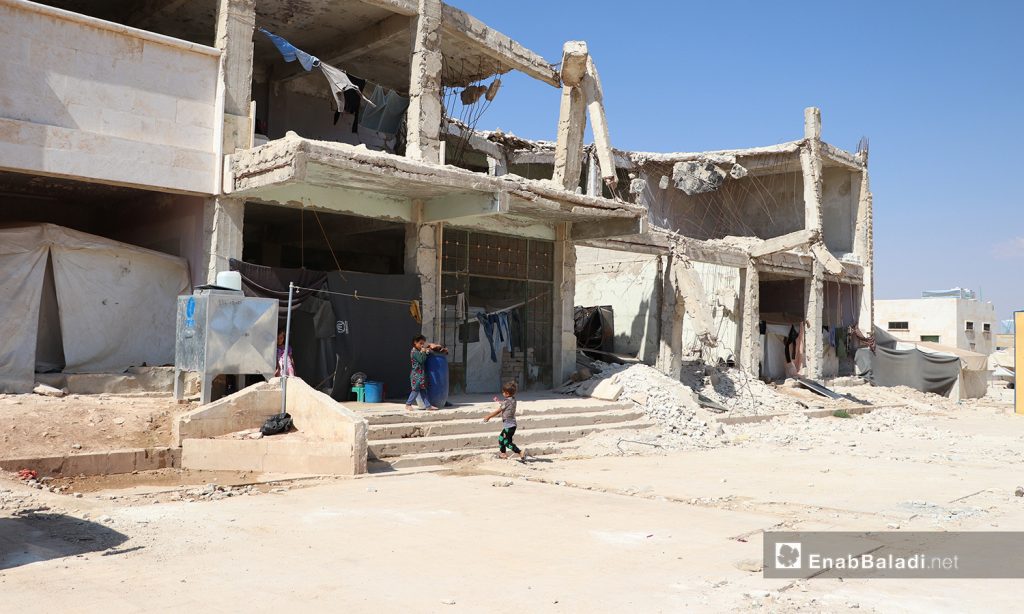Aleppo – Saber al-Halabi
After a long absence, Batoul returned to her family’s house in the district of Masaken Hanano in the governorate of Aleppo. Her plan was to restore the house and settle in it. However, she was shocked that another family was living in her house. The family told her they bought the house from a real estate agency, which purchased the house at a real estate auction held by the Syrian regime’s General Establishment for Military Housing (GEMH).
Requesting that her last name be withheld for security reasons, Batoul told Enab Baladi that she made many attempts to find out why the ownership of her family’s house was transferred to other people at a public auction without her knowledge. She first visited the Judicial Registry Office, then the Real Estate Registry Secretariat, and finally the Real Estate Registration Office.
“A few days later, I learned that my family’s house had been marked by the GEMH. The establishment seized the house because one of my brothers worked with the armed opposition when they controlled the neighborhood.”
Batoul, 34 years old, is the rightful heir of the property. Therefore, she filed a lawsuit in court, demanding the return of her personal property. However, the court ruled that the decision of the property ownership transfer to the family, the secondary occupants, could not be contested. Batoul felt disappointed after she found out that “she will not get anything back.”
Government auctioning seized homes
The GEMH announces auctions for the sale of houses in various neighborhoods of Aleppo, especially the eastern and southern ones. These neighborhoods were under the control of armed opposition factions between 2012 and 2016. Most of these homes were abandoned by their owners after they were forced to leave in late 2016.
The housing apartments are sold at an auction, depending on their general condition. The establishment does not carry repairs or maintenance of the apartment or house offered for sale, a civilian servant at the establishment, who declined to mention his name for security reasons, told Enab Baladi.
The housing apartments are offered for sale after being seized for two reasons. First, some house owners had taken loans from banks but may have been unable to repay them. Second, other owners were “working with the opposition and their properties were seized because they killed soldiers and civilians, and they caused them material damage,” the civilian servant told Enab Baladi.
According to the civilian servant, in the Sukari neighborhood of the northern city of Aleppo, several houses and apartments have been recently sold at auctions, some of which are destroyed and in need of restoration.
According to the Syrian Civil Procedure Code, these properties, including shops, enter the public auction after being seized because their owners did not fulfill their financial obligations.
The apartments of the Military Housing Establishment are seized because their owners were officers in the Syrian regime forces, but they defected and joined the Syrian opposition. As a result, their properties were sold at a public auction.
Properties, in fact, cannot be sold at public auction until they are registered in the real estate registry, under the provisions governing the real estate registry No. 188 of 1926.
The civilian servant pointed out that those who benefit most from selling properties are real estate agents. They repair the houses to make them habitable. Then, they sell at double prices to earn some profits. This process ”takes place without the knowledge of the properties’ original owners,” who could be displaced, dead, or disappeared.
Bribery
Bidders wishing to participate in auctions submit the bid documents at the headquarters of the GEMH in the neighborhood of New Aleppo. Ineligible bid applications are rejected by the GEMH.
Therefore, many applicants tend to pay bribes (which are estimated at half a million Syrian pounds- 158 USD ) to employees and head departments to complete the necessary procedures and ratify their documents, a real estate agent, who participated in an auction after he bribed an employee at the GEMH, told Enab Baladi.
The real estate agent, who is in his forties, had to pay 700,000 SYP (218 USD) in order to ratify his documents to participate in the auction announced by the establishment last April.
Scheduled auctions
Hundreds of houses and apartments are currently scheduled for sale through GEMH auctions.
Some of these houses and apartments will be demolished and replaced by new housing complexes for the GEMH-affiliated Military Construction Department.
Another employee at the GEMH, who requested his name be withheld for security reasons, told Enab Baladi that the establishment oversees the construction of the housing complexes that are sold through installments-based subscriptions. The first payment is estimated at about 50,000 Syrian pounds (15 USD).
The majority of the owners of seized properties cannot undo the seizure. Even their relatives, who own specific quotas or shares, cannot do so because they fear that the Military Security may harass them if they claim their rights in those properties.

